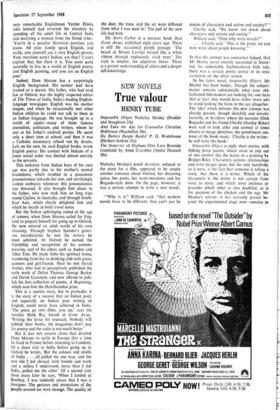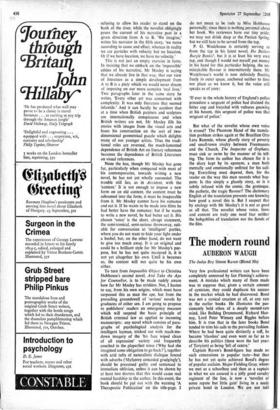NEW NOVELS
True valour
HENRY TUBE
And Take the Ape for Counsellor Christina Hobhouse (Macmillan 30s) Do Butlers Burgle Banks? P. G. Wodehouse (Herbert Jenkins 21s) The Inspector of Orphans Otto Lara Resende translated by Anne Cravinho (Andre Deutsch 30s) Nicholas Mosley's novel Accident, reduced to the story for a film, appeared to be simply another romance about Oxford, her dreaming spires, her punts, her water-meadows and her Bogarde-style dons. On the page, however, it was a serious attempt to write a new novel: "Why is it," William said, "that modern novels have to be different, they can't just be stories of characters and action and society?"' Charlie said, "We know too much about characters and actions and society."
William said, "Then why write novels?"
. . . Charlie said, "This is the point, we can now write about people knowing."' In that the attempt was somewhat fudged, that Mr Mosley never entirely succeeded in 'know- ing' his undeniably Technicolored little tale, there was a certain poetic justice in its rein- carnation on the silver screen.
In his latest novel, Impossible Object, Mr Mosley has been bolder. Though the subject- matter remains substantially what your old- fashioned film-makers are looking for, one feels that at least they would have rather more ado to avoid looking the form in the eye altogether. The 'idea' which informs this new attempt was already present, though sketchily and unsatis- factorily, in Accident, where the narrator (Dirk Bogarde) and his friend Charlie (Stanley Baker) were said to look alike and seemed at times almost to merge identities; the penultimate sen- tence of the book reads: 'Charlie is the writer: he will write this book.'
Impossible Object is eight short stories, with linking prose poems, which swim in and out of one another like the waves in a painting by Bridget Riley. Characters, actions, relationships and even images recur, but the only handhold, as it were, is the (act that someone is telling a story, that there is a writer. Which of the characters is the writer is not certain from story to story, and which story encloses or precedes which other is also doubtful, as is the question of the chicken and the egg. Mr Mosley's reform—it has certainly passed be- yond the experimental stage now—consists in refusing to allow his reader to stand on the bank of the river, while the novelist obligingly pours the current of his narrative past in a given direction from A to B. 'We imagine,' writes his narrator in the fifth story, 'we move according to cause and effect, whereas in reality we are particles with velocity but no location. Or if we have location, we have no velocity.'
This is not just an empty exercise in form. In insisting that we embark on the 'impossible' eddies of his narrative, Mr Mosley is saying that we already live in that way, that our view of literature as a simple development from A to B is a piety which we would never dream of imposing on our more complex 'real lives.' Two paragraphs later in the same story he writes, 'Every other art was concerned with complexity. It was only literature that seemed infantile.' And it can hardly be accident that at a time when British painters and sculptors are internationally conspicuous and when British writers are not, Mr Mosley fills his stories with images from the visual arts and bases his construction on the sort of two- dimensional geometrical puzzle which delights many of our younger artists. Thus the tradi- tional roles are reversed, the much-lamented dependence of British Art on literary references becomes the dependence of British Literature on visual references.
None the less, though Mr Mosley has gone far, particularly when compared with most of his contemporaries, towards writing a new novel, he has not yet wholly succeeded. The trouble still lies, as in Accident, with the 'content.' It is not enough to impose a new form on an old content, the content must be subsumed into the form, it must be inseparable from it. Mr Mosley cannot have his romance and eat it. If he wants to be made into films he had better have the romance; but if he wants to write a new novel, he had better eat it. His chosen 'voice' is the short, abrupt statement, the semi-ironical, semi-serious throwaway, suit- able for conversation at 'intelligent' parties, where you do not want to hide your light under a bushel, but, on the other hand, do not want to give too much away. It is an original and could be a brilliant style for Mr Mosley's pur- pose, but he has not quite mastered it, it is not yet altogether his own. Unfit it becomes so, the content will not quite be his own either.
To turn from Impossible Object to Christina Hobhouse's second novel, And Take the Ape for Counsellor, is to be made rudely aware how far Mr Mosley has stridden. Not, I hasten to say, from his own origins, which must have surpassed this as man the ape, but from the prevailing groundswell of 'serious' novels by graduates of either sex. I am going to propose to publishers' readers an emergency measure which will suspend the basic principle of British criminal law as applied to incoming manuscripts: any novel which consists of para- graphs of psychological analysis for the intelligent layman, tricked out with reach-me- down imagery of the 'his face wiped clean of all expression' variety and frequently couched in the pluperfect tense ('Why had she imagined some obligation to go back?'), together with arid tufts of naturalistic dialogue fenced with adverbs ('Myfanwy conceded grudgingly'), should be presumed guilty and sentenced to immediate oblivion, unless it can be shown by at least two doctors that this would cause real mental hardship to the author. In this event, the book should be put out with the warning 'A Therapeutic Publication' on the title-page. I
do not mean to be rude to Miss Hobhouse personally, since there is nothing personal about her book. We reviewers have our tiny pride; we may not drink deep at the Pierian Spring, but we still hate to be served from the tap.
P. G. Wodehouse is certainly serving us from the tap in his latest novel, Do Butlers Burgle Banks?, but it is at least his very own tap, and though I would not myself put money in his hand for this particular helping, the un- mistakable flavour is intermittently there. Mr Wodehouse's world is now definitely floating freely in outer space, anchored neither to time nor place as we know it, but the voice still speaks as of yore:
'If ever in the whole history of England's police procedure a sergeant of police had drained the bitter cup and bicycled with vultures gnawing at his bosom, this sergeant of police was that sergeant of police.'
But what of the novelist whose own voice is erased? The Phantom Hand of the transla- tion problem strikes again at the Brazilian Otto Lara Resende, whose ghastly story of poverty and small-town rivalry between Freemasons and the Church, The Inspector of Orphans, must sink or swim by the manner of its tell- ing. The form its author has chosen for it is the diary kept by its eponym, a man both mentally and emotionally unfitted for his call- ing. Everything must depend, then, for the reader on the way this man records what hap- pens. Is this simply a ghastly story, or is it subtly infused with the comic, the grotesque, the pathetic, the tragic flavour? The dictionary English of the translation prevents one knowing how good a novel this is. But I suspect that by analogy with Mr Mosley's it is not as good as all that. The novelist whose voice, form and content are truly one need fear neither the hobgoblins of translation nor the fiends of the film.











































 Previous page
Previous page